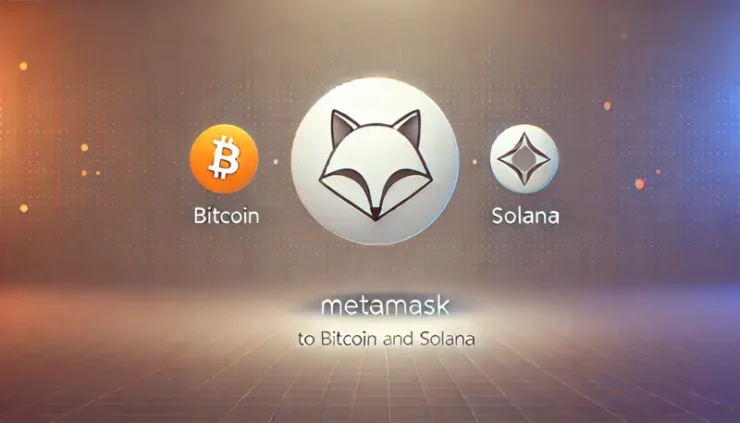MetaMask is no longer just an Ethereum wallet, it’s evolving into a cross-chain powerhouse, now integrating Bitcoin and Solana. Now, the platform is making its most significant expansion yet, supporting Bitcoin and Solana while introducing a roadmap that could make gas fees obsolete. With millions of users worldwide and a growing appetite for simpler, more seamless crypto transactions, MetaMask is positioning itself as the universal gateway to Web3.
This expansion marks a turning point. While MetaMask initially only supported Ethereum-based transactions, the addition of Bitcoin in Q3 2025 and Solana in May will make it one of the most comprehensive wallets available. The move comes amid increasing competition from rival wallets that already support multiple blockchains. With this latest update, MetaMask aims to eliminate friction between ecosystems, allowing users to interact across networks without juggling multiple wallets.
Breaking Barriers: Bitcoin and Solana Integration
MetaMask’s foray into Bitcoin and Solana is a strategic push to consolidate its dominance in the Web3 space. Bitcoin, the world’s largest cryptocurrency, and Solana, known for its high-speed transactions, have long been outside MetaMask’s purview. Until now, users needed separate wallets to interact with these chains, creating a fragmented experience.
By integrating Bitcoin, MetaMask allows users to manage their BTC holdings within a single interface, eliminating the need for custodial services or wrapped tokens. Meanwhile, Solana’s inclusion brings native support for one of the fastest-growing ecosystems in decentralized finance (DeFi) and non-fungible tokens (NFTs). This move also helps MetaMask compete with wallets like Phantom and Rabby, which have gained traction among Solana users in recent years.
But the most transformative aspect of this expansion isn’t just cross-chain compatibility—it’s the potential for MetaMask to act as a single point of access for all major blockchains. With Bitcoin and Solana on board, users can swap assets, manage DeFi investments, and interact with decentralized applications (dApps) without leaving the MetaMask interface.
A Future Without Gas Fees?
One of the biggest pain points in the crypto space is gas fees—the often unpredictable transaction costs that users must pay to interact with blockchain networks. MetaMask has announced plans to phase out gas fees as a user-facing concern, starting with gas-included swaps and eventually enabling payments in any token.
In March, MetaMask will expand its gas-included swap feature, allowing users to pay transaction fees using any token they hold. This means that even if a user doesn’t have ETH in their wallet, they can still execute transactions by covering the cost with their preferred asset. Over time, the company envisions a future where gas fees are abstracted entirely, making blockchain interactions as simple as traditional finance transactions.
MetaMask is also introducing ERC-5792 batched transactions, which allow users to combine multiple actions—such as approving and swapping tokens—into a single, seamless process. This reduces transaction times and further optimizes gas costs, making DeFi more accessible to both newcomers and experienced traders.
The MetaMask Card and Smart Accounts
MetaMask’s ambitions extend beyond just blockchain integration. In a move to bridge the gap between crypto and traditional finance, the company has launched the MetaMask Card, which allows users to spend their crypto holdings anywhere Mastercard is accepted. Initially available in select regions, the card aims to make self-custody wallets more practical for everyday transactions, offering a direct alternative to centralized exchanges.
Another major innovation is the shift from Externally Owned Accounts (EOAs) to smart-contract-based accounts. By leveraging Ethereum’s upcoming Pectra upgrade, MetaMask plans to introduce programmable accounts that provide enhanced security and functionality. This will enable features such as automatic spending limits, decentralized AI trading agents, and on-chain subscriptions—all without compromising user control.
The implications of these updates are vast. By integrating Bitcoin and Solana, optimizing transaction costs, and enhancing usability, MetaMask is positioning itself as the default wallet for the decentralized web. As Web3 adoption accelerates, the platform’s latest moves could set new standards for how users interact with digital assets across multiple ecosystems.





